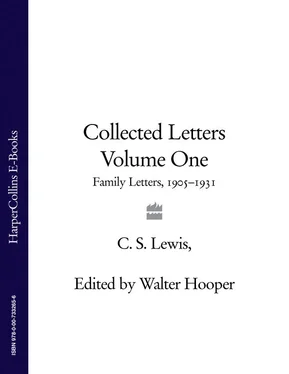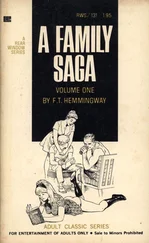I am glad to hear you have read Esmond: 10 it is one of my favourite novels, and I hardly know which to praise most, the wonderful, musical, Queen Anne English, or the delicate beauty of the story. True, I did rather resent the history, and still maintain, that when a man sets out to write a novel he has no right to ram an European War down your throat–it is like going back to Henty! 11 Did you ever try that arch-fiend?
I am surprised that there is no snow in Ulster as we had a week of good, thick, firm, ‘picture’ snow–and very much I enjoyed it. And other things too! She is better now, up & about, and we have progressed very rapidly. In fact the great event is actually fixed–fixed!–do you realize that? I don’t think I’ve ever been so bucked about anything in my life, she’s an awfully decent sort. 12 But I suppose this is boring you, so I must cut short my raptures–& my letter.
Yours
Jack
TO HIS FATHER (LP IV: 292-3):
[Gastons]
Postmark: 3 February 1915
My dear Papy,
As you will be by this time accustomed to my using ‘this week’ as synonymous with ‘next week’, I will make no further mention of that matter than to say that the Iliad which you are to exchange is being sent by the same post as this. I must confess to extraordinary dullness in failing to catch any point–if point there be–in your remark, ‘now for a nasty one’: ‘I found a Homer’. Why a nasty one? The fact that you have begun to suffer from a mania for sending poor, unnecessary unoffending books about the channel is nothing which should disturb the peace of mind of the philosophers of Gastons.
Talking about the channel reminds me of this morning’s news. Of course the really important feature of this submarine work is not so much the actual danger to goods and individuals as the inevitable ‘scare’ which it will cause, and the injury to business arising from that. I suppose this was their intention. As for the Zepplin talk, it seems to me to be rather childish folly on the part of the Germans: a few babies and an odd chimney stack cannot afford a recompense proportionate to the labour, expense and danger of managing an aerial raid. The only point is the moral influence, which again depends entirely on the amount of ‘guts’ of the victims.
I am glad to hear that the new Kiplings are poems, as we have had none of them yet. The question as to whether he was a greater poet or proseur is one of those everlasting things. Perhaps however, we may admit that someone else might possibly have written his best poems, but there is only one man alive who could have written ‘Kim’ or the ‘Jungle books’ or ‘Puck’. 13 I am not sure whether I have read the Seven Seas or not. Is it there that the ballads about the prehistoric Song-Man and Picture Man (the story of Ung) occurs? 14 I remember they make a very interesting criticism on artists and their public, ancient and modern, and impressed me greatly.
We have had one day of spring and are now paying for it by a wind and a rain that would take you off your feet. My German is progressing with such alarming success that I am rather afraid they will put me under suspicious as a spy! Keep well.
your loving son,
Jack
TO HIS FATHER (LP IV: 296-7):
[Gastons]
Postmark: 13 February 1915
My dear Papy,
As Spenser naively remarks at the beginning of about the thousandth canto of his poem,
‘Oh, what an endlesse work I have in hand’, 15
so might a parent doomed to supply an ignorant philosopher with the forgotten necessities of life echo the sentiment. Or in other words there is ‘still one river to cross’, and I really do think this will be the end. What I want is a copy of the Helena of Euripides, 16 which you will find kicking its heels somewhere in the little end room. The shoes have just arrived, for which many thanks: and by the way, when I want to pay for anything, we’ll let you know boss, don’t worry.
I am very annoyed that an opera company should come while I am away from home, although indeed it is a common enough state of affairs. Perhaps we are accustomed to regard John Harrison as an oratorio singer and it would be rather a shock to hear him in opera, although I have often seen records of him in operatic songs. I think you would be wise if you raised the energy to go. Perhaps Uncle Hamilton and Aunt Annie would care to take you–do you think so?
They must be having a rotten time at Glenmachan: ‘les jeunes maries’ particularly are making a bright start, aren’t they? What one always feels about these troubles is that they are so hard on poor Bob. 17 Is it not cruel when a poor fellow is doing his best, working away at his music all night and slaving like a nigger to make things bright and cheerful for everyone else, never letting his conversation flag, saving many a dull hour from ennui and always unselfishly making his wishes subservient to the comfort of the household–is it not hard that he should meet trouble like this? And yet–you will hardly believe it–I have heard people so brutal as to suggest that this ‘angel in the house’ ought to be at the front!
Everything here is pretty much as usual. The weather is delightful and Kirk’s thoughts turn even lightlier than of old to agriculture. His chief ‘stunt’ at present is to point out the fact that he is the same age as Balfour, 18 and ask whether he (K) would stand any chance of getting a job as Headmaster now: and if not, is he to understand that the care of a few schoolboys calls for more qualities of youthful energy and intellect than that of the British Empire? Well, perhaps he’s right; we have often heard him say so at any rate.
I have been reading this week a book by Swinburne from the Library, a ‘Study on Shakespeare’. 19 This is my first experience of his prose, and I think I shall make it the last. ‘Apt alliteration’s artful aid’ may be all right in verse, but it is undoubtedly vicious in prose, as also are words like ‘plenilune’, ‘Mellisonant’, ‘tautologous’, ‘intromission’. And yet at the same time there is great force in the book, and his appreciation of the subject is very infectious.
your loving son,
Jack
P.S. You might give me the Colonel’s address in your next letter. J.
TO ARTHUR GREEVES (W):
[Gastons
16 February 1915]
Dear Arthur,
When I received your epistle, which certainly did not weary one by its length, I was in one of my black moods: like Saul, my evil spirit was upon me. 20 Having just had a sufficient glimpse of home and of my brother to tantalize but not to satisfy: 21 having lost, if not for good, at least for this term, an unparalleled opportunity: and finding a very objectionable visitor in possession of my grinder’s house, you may well imagine that I was in no mood for an extra irritation. I had just, too, been out for a walk, mon dieu, a nightmare! Splashing thro great puddles beneath a leaden sky that rained and rained! However, enough of this.
You ask me what was the matter with me when I was at home. Thank you: I believe I enjoyed excellent health. Of course it is true, that we saw a good deal more of our relations than we wanted, and had none too much time to ourselves: but of course, you, or any member of your household, are always welcome.
As to the other grievance, it really is phenominal ill luck. Of course, like all the rest of her sex she is incapable of seeing anything fair, and when she had been persuaded after a good deal of difficulty to do this, and then I failed to turn up, it is only to be expected that I am ‘left’. In any case, it would be impossible now; as she has gone with her mother for a week to visit some other Belgians in Birmingham. 22 But perhaps you are tired of my ‘affaires’.
Читать дальше












